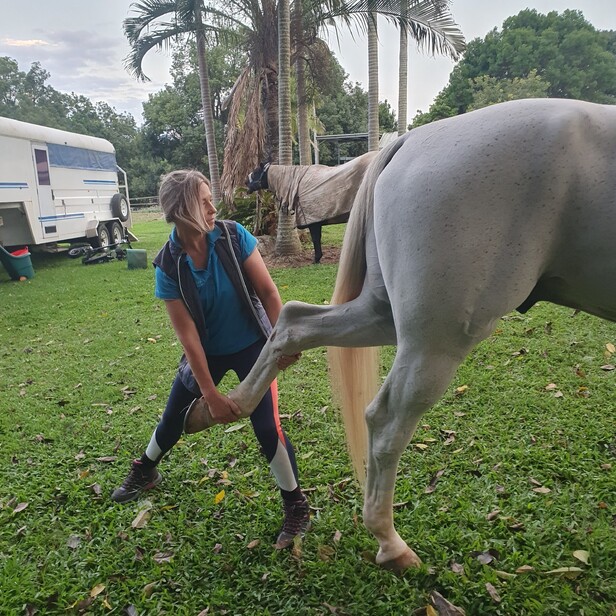Equine Physiotherapy
Physiotherapy for horses may be for treatment of a specific condition, or for routine maintenance in performance horses.
The physiotherapy assessment begins with obtaining a detailed history from the owner, followed by gait assessment, a ‘hands-on’ assessment of the patient, and specific tests such as range of motion, joint and neurological tests.
Owners will be provided with an individualised home exercise programme for their animal following the consultation.
Equine Physiotherapy Treatments
Conditions Treated
Back and neck pain including Saddle-related pain
Tendon Injury, Suspensory Ligament Injury, Muscle strain or tear
Performance maintenance (for equine athletes) or addressing performance problems
Post-surgery rehabilitation
Kissing Spine
Sacroiliac Disorder
Osteoarthritis and other joint conditions
Stifle Lock
Following Injury or Surgery
Horses that are involved in a traumatic accident or fall often sustain soft tissue injuries, fractures or wounds associated with the accident. Surgery may be required following these injuries, or in cases where there may be an underlying condition affecting the horses’ health or performance.
Physiotherapists work alongside veterinary surgeons in the treatment of horses recovering from surgical repair of fractures, tendon and muscle repair, arthroscopic joint surgery, and abdominal surgery. Following surgery, a period of rehabilitation is required to return the horse to optimal function. Physiotherapy helps to reduce pain, enhance healing, prevent muscle atrophy, and restore movement and athletic performance.
Competition Horse
Training and competition can predispose horses to the development of back pain, soft tissue injuries, stress fractures and other musculoskeletal injuries due to the demands of their sport.
Physiotherapy can achieve and maintain competition performance through increasing flexibility, correcting muscle imbalances, increasing sport-specific skills, and enhancing tissue recovery post-competition.
Physiotherapy can also assist with prevention of injury through pre-screening for potential problems that may result in pain, loss of performance, or lead to injury.
The Older Patient
Arthritis (also known as degenerative joint disease) is not uncommon in horses, and can be the result of injury, congenital conditions that an horse has suffered from an early age, or an athletic career.
Physiotherapy can assist with reducing pain, improving range of motion, and restoring functional movement. With the help of physiotherapy, a horse may be able to continue an athletic career, remain active, or simply enjoy an improved quality of life.
Appointment Details
Katrinka is available to do Equine visits by appointment in the following areas:
Sunshine Coast
Noosa Hinterland
Appointment Pricing
Initial Physiotherapy Consultation (60 - 90mins depending on case complexity) $169
Revisit Physiotherapy Consultation (45mins) $158
Travel Costs
Home visits will incur a mileage cost based on kilometres travelled from the business base (Peregian Springs) to the appointment.


